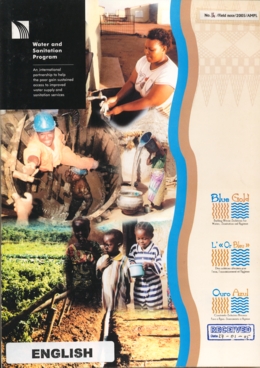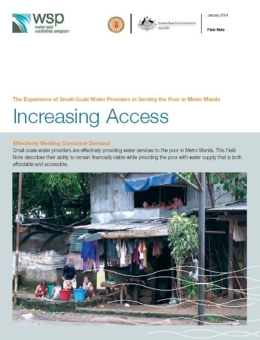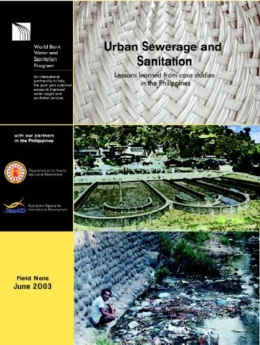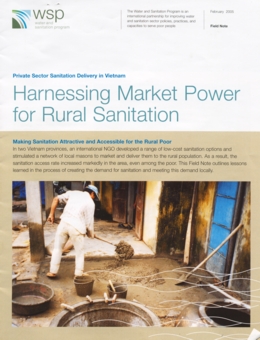Laporan/Prosiding

Blue Gold - Building African Solutions for Water, Sanitation and Hygiene
te Fiel
1.041
Building African Solutions for Water, Sanitation and Hygiene
Blue Gold is a series of filed notes and leaflets, published by the Water and Sanitation Program-Africa Region, which highlight effective African actions which have worked at scale in the water, sanitation and hygiene sector.

Blue Gold - Building African Solutions for Water, Sanitation and Hygiene
WSP
2002
1.038
Blue Gold is a series of Field Notes and Leaflets, published by the Water and Sanitation Program-Africa Region, which highlights effective African actions which have worked at scale in the water, sanitation and hygiene sector. To the new generation of parliamentarians, sector leaders, administrators and individuals tackling the water and sanitation challenge in the region, the Blue Gold series brings the message: Africa's future solutions will be African solutions.
To often we encounter negative images of Africa-poverty, conflict, famine. This series aims to tell a different story by tapping the rich vein of positive and innovative experience within the field of water, sanitation and hygiene in the continent- Blue Gold.
Topics covered in the Blue Gold series include:
- Water and Sanitation Sector Reform in Uganda and Ghana
- National Water and Sanitation Programme in South Africa
- National Sanitation Programmes in Mozambique and Lesotho
- Rural Piped Water Supplies in Ethiopia, Malawi and Kenya
- Strategic Urban Sanitation in Ouagadougou, Burkina Faso
- Household-level Water Supply in Zimbabwe
- Urban Water Supply in Abidjan, Cote d'Ivoire
- Hygiene Promotion in Burkina Faso and Zimbabwe

Increasing Access - The experience of small-scale water providers in serving the poor in Metro Manila
20 Janu
997
Small-scale water providers continue to supply water to many parts of Metro Manila. Some providers cover all the water needs of a household, while others supplement the services of the major water concessionaires operating in the city. A WSP-EAP study of 10 small-scale water providers in Metro Manila identified five different types of water providers, with each type employing its own business model and catering to different groups of customers. Some providers show an exceptional ability to serve poorer segments of the city. The study found that a high proportion of the poor rely on water services supplied by small-scale water providers, but that these households pay a higher unit rate for the water than their more affluent neighbors. The study yields a number of recommendations, including rationalizing the price of water for poor customers, improving service efficiencies to reduce the costs of supplying water, and developing collaborative relationships among the government regulator, utility, and small-scale water providers.
lihat selengkapnya

Urban Sewerage and Sanitation - Lessons learned from case studies in the Philippines
3 Juni
1.315
Lessons learned from case studies in the Philippines
Penerbit: WSP-EAP, Jun 2003
Urban sanitation is one of the most serious challenges facing the Government of the Philippines. As a result of rising urbanization over the last twenty years, more than half the population now live in densely populated cities and towns. By some estimates, about 80% of these urban households have access to adequate sanitation, such as toilets, but the vast majority of them are reliant on private sanitation facilities.
Less than 8% of the households in Metro Manila have sewer connections, and coverage is lower still in the rest of the country. Only three of the 1,500 cities and towns in the Philippines contain functioning public sewerage systems, and these are now old, undersized, and in need of major rehabilitation. A few communal toilets have been constructed in low-income urban areas, but there is little evidence of any other public sanitation services.
lihat selengkapnya

Self Supply: A Fresh Approach to Water for Rural Population
2 Nove
1.156
Penerbit: Water and sanitation program (WSP), Nov 2004
Every year, thousands of rural householders and small groups invest in traditionally dug wells and scoopholes to provide convenient water supplies which they manage and maintain themselves. These water sources number over a million in Africa alone. Many rural people value these sources for their convenience, taste, productive use and, most importantly, the sense of ownership and control bestowed. However, policymakers tend to regard them as a liability to be replaced rather than improved or augmented, and rural water supply strategies continue to concentrate on communal supplies for groups of 200 to 500 people.
Research in Zambia has found widespread grass-roots demand for smallscale water supply improvements1, and has subsequently developed models by which communities could improve the quality of their supplies. A project, funded by the UK Department for International Development(DFID) and implemented in partnership with the government of Zambia, now incorporates these models into national rural water supply strategy guidelines as an option alongside conventional approaches.
Self supply builds on the widespread desire of the rural poor to invest in solutions that bene.t their small group or household directly, rather than as members of what are often scattered or discordant communities. It’s components include improved availability of water from an increased number of supplies (such as traditional sources and rainwater harvesting); improved water quality (through source protection, improved water collection and storage practices, and household water treatment); and, improved water lifting for productive use. Self supply offers choice of technology, progressive upgrading, and replicability with little (if any) dependence on outside funds, enabling rapid and signi.cant improvements to the lives of millions of people.
lihat selengkapnya

Increasing Access: The Experience of Small-Scale Water Providers in Serving the Poor in Metro Manila
WSP
4 Th.
1.141
This field note describes their ability to remain financially viable while providing the poor with water supply that is both affordable and accessible.

Urban Sewerage and Sanitation - Lessons learned from case studies in the Philippines
Andy Robinson
Th.
1.011
Summary
Background
Case Studies
Factors of Success
Conclusions
Recommendations

Private Sector Sanitation Delivery in Vietnam: Harnessing Market Power for Rural Sanitation
2 Febr
936
Harnessing Market Power for Rural Sanitation
Making Sanitation Attractive and Accessible for the Rural Poor
Sebuah LSM internasional mengembangkan serangkaian pilihan-pilihan sanitasi rendah biaya di dua propinsi di Vietnam dan menstimulasi jaringan pekerja bangunan setempat untuk memasarkan dan mendistribusikan kepada masyarakat pedesaan. Sebagai hasilnya, tingkat akses terhadap sanitasi naik secara tajam (bahkan di antara masyarakat miskin) di wilayah tersebut. Catatan Lapangan ini menggarisbawahi pelajaran-pelajaran yang diperoleh (lesson learned) dalam proses penciptaan kebutuhan terhadap sanitasi dan bagaimana memenuhi kebutuhan tersebut dengan memanfaatkan sumberdaya lokal.
lihat selengkapnya

Harnessing Market Power for Rural Sanitation: Private Sector Sanitation Delivery in Vietnam
WSP
Th.
1.065
This field note outlines lessons learned in the process of creating the demand for sanitation and meeting this demand locally.
